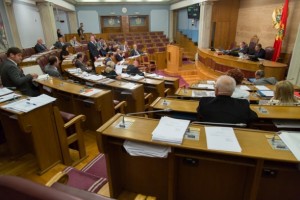Montenegro Could Be Headed for a Mountain of Trouble
BALKANS AND EASTERN EUROPE, 21 Sep 2015
Andrew Korybko – Oriental Review
Editor’s Note: Despite public hesitation on the issue of Montenegro’s membership in NATO, yesterday the country’s parliament adopted a symbolic resolution in favor of a future accession to the alliance. Hereby we publish a briefing by our permanent contributor with an analysis of geopolitical context and possible implications of the chamber decision.
17 Sep 2015 – The tiny Balkan state of Montenegro is having a Ukrainian-esque “either-or” choice forced upon its population, which in this case is whether or not the country should join NATO by the end of the year. By all indications, the US will support an initiative to extend membership to Montenegro during the upcoming NATO meeting in December, and the almost more than two-decade-long-straight Djukanovic government appears more than eager to accept. The trouble, however, is that just as many people are against joining the military bloc as those who support doing so, and the Democratic Front party has called for the entire opposition to gather in the capital on 27 September to protest against the government’s unilateral action. They say that it would be undemocratic for such a significant decision to be made without a referendum, let alone in such a near-even polarized political climate, and the forthcoming manifestations next weekend in Podgorica might turn into a social referendum on the government itself. With Montenegro heading towards what might turn out to be a mountain of trouble, it’s important for observers to bring themselves up to speed on the situation and place it into the larger geopolitical context.
It’s impossible to separate NATO’s actions in Montenegro from its larger strategic goals in Serbia. The two populations enjoy exceptionally fraternal relations, and one could argue that if it wasn’t for the 1999 War on Yugoslavia, they’d still be united under one state. History doesn’t have any hypotheticals, however, so one must deal with the present as it currently is, and the contemporary situation is that one of the two very similar states, Montenegro, is on the cusp of joining the exact same organization that bombed it and its then-fellow Serbian countrymen 16 years ago. Aside from the national humiliation that this entails, it must also be looked at as a maneuver to further split the two brotherly states along military lines, with a NATO-dedicated Montenegro almost completing the full encirclement of Serbia and enacting heightened psychological pressure on Belgrade for that very fact.
Other than the military reasons associated with this development, there are also more subtle political-economic ones as well. History demonstrates that many future EU members first ‘paid their dues’ in NATO before being allowed to join the EU, and it looks to be no different in the case of Montenegro. The reason Djukanovic is so gung-ho about joining the EU is so that he can attain ‘institutional legitimacy’ for his vast family-controlled business empire, which includes everything from cigarette smuggling to beachfront property. His enthusiasm for the carrot of potential membership is so great that he even ordered his government to enact sanctions against Russia as a signal of solidarity with Brussels. This decision was made despite the fact a third of all registered companies are linked to Russia. Moscow has of course retaliated with agricultural counter-sanctions and earlier threats to revoke the visa-free travel agreement that brings so many Russian holidaymakers and their checkbooks to the country each year. The reason Djukanovic would risk such self-inflicted economic damage to his country is evident, and that’s to clean out all the other businesses he and his family have yet to own in order to acquire them for bare-bottom prices shortly thereafter.
Popular Pushback
 The people of Montenegro aren’t taking their undemocratic whipping and forthcoming fleecing quietly, however, as the Movement for Neutrality plans to become the core of popular resistance to both NATO and Djukanovic. As mentioned in the beginning of the briefing, the goal is for them and the Democratic Front to gather the disaffected masses on 27 September to stage a patriotic and peaceful resistance to the country’s current direction. Think of it as a reverse of the historic pro-government rally in nearby Macedonia back in May, just this time with crowds of well-behaved anti-government protesters whose numbers also greatly overwhelm their political rivals. The purpose of this manifestation is to show the world that democracy and the peoples’ will must be respected in their country, which once again follows in the footsteps that the Macedonians so bravely set a couple months before them.
The people of Montenegro aren’t taking their undemocratic whipping and forthcoming fleecing quietly, however, as the Movement for Neutrality plans to become the core of popular resistance to both NATO and Djukanovic. As mentioned in the beginning of the briefing, the goal is for them and the Democratic Front to gather the disaffected masses on 27 September to stage a patriotic and peaceful resistance to the country’s current direction. Think of it as a reverse of the historic pro-government rally in nearby Macedonia back in May, just this time with crowds of well-behaved anti-government protesters whose numbers also greatly overwhelm their political rivals. The purpose of this manifestation is to show the world that democracy and the peoples’ will must be respected in their country, which once again follows in the footsteps that the Macedonians so bravely set a couple months before them.
Other motivators that could attract more people to protest are the deep bonds still felt by many Montenegrins towards their Serbian cultural brethren. The people of Montenegro understand the aggressive and unnecessary message that their ascension to NATO would send to their neighbors across the mountains, and in the interests of preserving friendly relations with them, they may decide to make a public statement through their protest action. More tangible to most Montenegrin families, however, is the premeditated economic calamity that Djukanovic is plotting for the population. As mentioned in the previous section, he purposely wants to destroy Russian-affiliated businesses (over a third of the country’s total) so that his family empire can swallow them up for enormous profit, but given the scope of how many people would be affected by this aggressive ‘corporate takeover’, it’s foreseeable that they might want to make one last hurrah in reversing the impending economic failure that their Prime Minister has planned for them. All of these factors thus combine to prove that any protest actions that take place on 27 September won’t be directed solely against NATO, but will also be an expression of popular outrage against Djukanovic.
Concluding Thoughts
The government is keenly aware of the main reason why so many people might turn out against it next weekend, which is why the potential for state-sponsored violence (either directly or through proxy mob) is so high. In a country with only a little bit more than 600,000 people, it’s easy for one political provocation or false flag attack to literally engulf the entire population in chaos. This means that Montenegro might enter into an acute crisis if enough citizens demonstrate on behalf of the opposition and Djukanovic gives the panicked order to use force against them if he feels his rule is threatened. His gangster mentality dictates that he would automatically resort to such ‘reflexes’, and the geopolitical situation is such that his NATO and EU affiliations would predictably shield him from any Western criticism for attacking what would likely by that time have already been slandered as “Putin’s proxies”. Nevertheless, this doesn’t mean that Montenegrins won’t take a page out of the Macedonians’ playbook and staunchly resist the foreign-supported force that’s attempting to take over their country, and it might just be that in hindsight one realizes that it was both peoples’ democratic resistance that finally put the brakes on NATO’s “Drang nach Suden” (Drive to the South).
_____________________________
Andrew Korybko is the American political commentator for the Sputnik agency.
Go to Original – orientalreview.org
DISCLAIMER: The statements, views and opinions expressed in pieces republished here are solely those of the authors and do not necessarily represent those of TMS. In accordance with title 17 U.S.C. section 107, this material is distributed without profit to those who have expressed a prior interest in receiving the included information for research and educational purposes. TMS has no affiliation whatsoever with the originator of this article nor is TMS endorsed or sponsored by the originator. “GO TO ORIGINAL” links are provided as a convenience to our readers and allow for verification of authenticity. However, as originating pages are often updated by their originating host sites, the versions posted may not match the versions our readers view when clicking the “GO TO ORIGINAL” links. This site contains copyrighted material the use of which has not always been specifically authorized by the copyright owner. We are making such material available in our efforts to advance understanding of environmental, political, human rights, economic, democracy, scientific, and social justice issues, etc. We believe this constitutes a ‘fair use’ of any such copyrighted material as provided for in section 107 of the US Copyright Law. In accordance with Title 17 U.S.C. Section 107, the material on this site is distributed without profit to those who have expressed a prior interest in receiving the included information for research and educational purposes. For more information go to: http://www.law.cornell.edu/uscode/17/107.shtml. If you wish to use copyrighted material from this site for purposes of your own that go beyond ‘fair use’, you must obtain permission from the copyright owner.
Read more
Click here to go to the current weekly digest or pick another article:
BALKANS AND EASTERN EUROPE:
